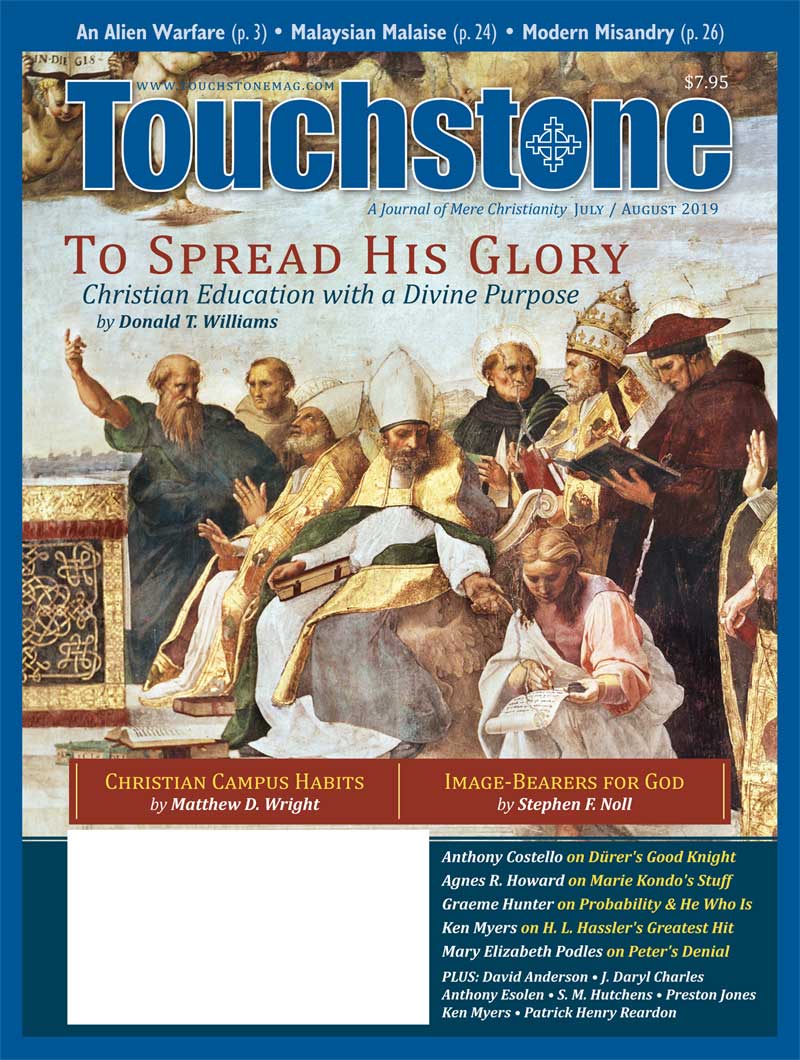Editorial
An Alien Warfare
Today’s Culture Wars Are Both Ancient & Modern
When I have taught twentieth-century history, both the European and American versions, I always have trouble when I try to explain “the Sixties” to my students. Like scientists, professional historians are not allowed to use metaphysical or spiritual explanations for events. What caused the mass hysteria that set in during the latter part of that decade? Why did every millennia-old, Western moral guidepost on sexual behavior and family life come under vicious assault? Why were there no effective defenders? The best materialistic explanation that I have come up with is that space aliens must have orbited earth and sent noxious gases down onto the Americas, Europe, and Oceania, which drove nearly everyone mad.
Benedict’s Letter
My own conundrums here came into sharp relief again when I read Pope Emeritus Benedict XVI’s missive dated April 10, 2019, on “The Church and the Scandal of Sexual Abuse.” In its candor and search for explanations, this document is stunning, perhaps unprecedented, in my view, at least. Notably, Benedict looks to the 1960s as the time when “the previously normative standards regarding sexuality collapsed entirely.” He points, almost quaintly, to episodes of the “new” sex education, pornographic outdoor advertising, and the popularity of raunchy films that he witnessed in Germany and Austria. These changes swelled into a demand for “all-out sexual freedom, one which no longer conceded any norms.”
Benedict goes on to say that this “mental collapse was also linked to a propensity for violence.” Indeed, I witnessed a relevant example of this continuing turn to violence on March 30–31 in Verona, Italy, during the World Congress of Families XIII, a pro-life, pro-natural family event. On that Saturday, about 20,000 angry protestors—self-labelled as feminists, anarchists, LGBT enthusiasts, and so on—marched toward the city square with the declared intent of shutting down the congress by force. Although hundreds of riot police stopped them short of their goal, several nasty scuffles ensued. On Sunday, in contrast, 30,000 persons—young and old, families and singles—marched in solidarity with the congress, without anger or fights. (Numerous videos of both events can be found on YouTube.) Importantly, Benedict links this propensity to violence in “the Revolution of 1968” to “pedophilia [which] was then also diagnosed as allowed and appropriate.”
In equally remarkable words, the pope emeritus describes a parallel “collapse” in Catholic moral theology “that rendered the Church defenseless.” In brief, he describes how theologians taking part in the Vatican II conclave abandoned the use of “natural law” as a guide to moral theology. In its place, he says, they tried to build a morality based entirely on Scripture.
No One Immune
At this point, sola scriptura Protestants might leap for joy, concluding that the Romanists had finally stumbled into truth. Alas, judge not, lest ye be judged. For 1968 was also the year when the leading lights of American Evangelicalism gathered under the auspices of their flagship publication Christianity Today to draft “A Protestant Affirmation on the Control of Human Reproduction.” Their consensus statement began: “The Bible does not expressly prohibit either contraception or abortion,” and they enthusiastically embraced both practices—without any limits—along with sterilization and aggressive “programs of population control at home and abroad.” (If a reader doubts this report, track down the 1969 Tyndale House Book, Birth Control and the Christian.) No one was immune from the alien gas.
Benedict goes on to show how Pope John Paul II, fully aware of this crisis, drafted his 1993 encyclical Veritatis Splendor and the new Catechism of the Catholic Church to try to set matters right. His core message: there are “actions that can never become good”; or rephrased, “there is a minimum set of morals which is indissolubly linked to the foundational principle of faith.”
An Absence
Another remarkable and noteworthy aspect of Benedict’s letter—this time an absence—is the lack of any mention of a relevant and very Catholic event also occurring in 1968: the issuance of Humanae Vitae, the encyclical on the transmission of human life by Pope Paul VI. This is peculiar, because no other Catholic action of the time so directly and shockingly challenged the Revolution of 1968.
Allan C. Carlson is the John Howard Distinguished Senior Fellow at the International Organization for the Family. His most recent book is Family Cycles: Strength, Decline & Renewal in American Domestic Life, 1630-2000 (Transaction, 2016). He and his wife have four grown children and nine grandchildren. A "cradle Lutheran," he worships in a congregation of the Lutheran Church-Missouri Synod. He is a senior editor for Touchstone.
bulk subscriptions
Order Touchstone subscriptions in bulk and save $10 per sub! Each subscription includes 6 issues of Touchstone plus full online access to touchstonemag.com—including archives, videos, and pdf downloads of recent issues for only $29.95 each! Great for churches or study groups.
Transactions will be processed on a secure server.
more on family from the online archives
more from the online archives
calling all readers
Please Donate
"There are magazines worth reading but few worth saving . . . Touchstone is just such a magazine."
—Alice von Hildebrand
"Here we do not concede one square millimeter of territory to falsehood, folly, contemporary sentimentality, or fashion. We speak the truth, and let God be our judge. . . . Touchstone is the one committedly Christian conservative journal."
—Anthony Esolen, Touchstone senior editor














